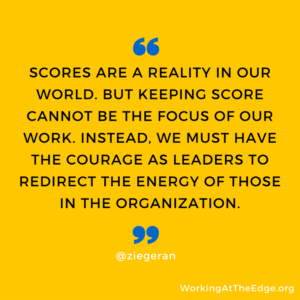 In Pennsylvania, the Department of Education recently released School Performance Profile Scores to the public. Using a complex (and convoluted) formula, the SPP is designed to inform the public of the academic performance measures of a school through a single score.
In Pennsylvania, the Department of Education recently released School Performance Profile Scores to the public. Using a complex (and convoluted) formula, the SPP is designed to inform the public of the academic performance measures of a school through a single score.
Around the same time as the release of the SPP, I read a post from author Todd Henry titled The Dangers of Keeping Score. While Henry’s audience is largely focused on creatives looking to improve productivity and performance, this quote prompted me to think more deeply about the SPP race that too many leaders (and policymakers/the public) buy into:
…I was keeping score. This is an old habit, and one that dies hard. I was paying attention to a lot of little markers that have nothing whatsoever to do with my core work, or my effectiveness, or the impact that I’m trying to have with my clients or the people who read my books and listen to my podcasts. Instead, I was paying attention to things outside of my lane, and allowing them to pull me off-course and rob me of the joy and satisfaction that I should have been experiencing.
When school SPP scores are released, it’s natural for us educators to wonder how we stack up against other schools across the state and particularly in our region and county. As leaders, do we have the courage to stop keeping score? To not be distracted from the real work of improvement and growth? We already know a two digit score (or three digits if you’re near-perfect and get “extra credit”) cannot possibly communicate the nuances of our work and the work of our learners on a daily basis. So how do we break this vicious cycle of keeping score – this game that serves nobody?
Elevating the leadership conversation
Here are three things you do to start shifting the focus off keeping score:
- Work with your stakeholders to create a compelling vision for learning in your classrooms. Ask questions about the current work of your schools and whether it is preparing learners with the best opportunities to develop knowledge, skills and dispositions that will ensure a successful future. What do your learners need to know and be able to do upon graduation? What are the optimal learning environments to develop the needed competencies? We are doing this work in Salisbury using our Profile of a Graduate and Learning Beliefs to anchor the conversation.
- Work with your leadership team to create an organizational culture that mirrors the learning culture you want in your classrooms. Ask questions about the work environment for teachers and leaders. Does the work environment reflect the environment you want for your learners? How do you as a leader create the culture for your educators to bring about systemic change? Scho0l-centered leadership is very different from learner-centered leadership.
- Help your stakeholders see and understand the context of education in the future. Ask questions about the future context of life in the US and the world. Our current Kindergartners will graduate in 2029. What will the world be like? What will they need? Will they be prepared? Is keeping score helping to prepare them for this future? I have been exploring the resources at KnowledgeWorks and their future of learning forecast, Education in the Era of Partners in Code. Some fascinating stuff!
Scores are a reality in our world. But keeping score cannot be the focus of our work. Instead, we must have the courage as leaders to redirect the energy of those in the organization to develop a compelling vision for learning in the context of the near and distant future. The resultant vision must be learner-focused and go beyond the classroom to embrace learning as a complete organization.
What else can we as leaders do to take the focus off keeping score and put it on creating a learner-centered culture?
Connect with Randy on Twitter and on the TLTalkRadio podcast!
Get new content delivered to your inbox and the ebook 3 Key Principles of Digital Transformation. The ebook contains valuable information from my experience leading a digital transformation and working with a variety of stakeholders over the past decade.
- A silver lining - January 22, 2022
- Is our use of tech working against us? 🤔 - September 8, 2021
- What’s NOT going to change in the next 10 years? 🤔 - September 7, 2021